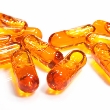
Statin intolerance is present in about 9% of statin-treated patients, according to a recent meta-analysis. This finding is getting a lot of attention and is likely to increase interest in supplements that might help limit statin-induced muscle pain and weakness. Be prepared to answer questions about coenzyme Q10.
Coenzyme Q10 is a compound that has a chemical structure similar to vitamin K. It’s made in the body and found in almost all cells, particularly in the heart, liver, kidney, and pancreas. Coenzyme Q10 and cholesterol share common synthetic pathways, and statins block the synthesis of both. Some believe that statin-induced muscle pain and weakness might be related to lower coenzyme Q10 levels, and that taking a coenzyme Q10 supplement might limit these side effects without hindering the cholesterol-lowering effects of statins.
Clinical data supporting this theory is conflicting. Some research shows that taking coenzyme Q10 100 mg by mouth twice daily for 3 months, with or without selenium, reduces muscle pain and weakness in people with statin intolerance when compared with placebo. However, other research shows no benefit. While the reasons for the conflicting data aren’t exactly clear, the inconsistent findings don’t seem to be related to the dose of coenzyme Q10.
For patients who don’t improve after standard measures to manage statin intolerance, taking a third-party certified coenzyme Q10 supplement for 30 days may be a reasonable option. It’s likely safe for most people and is usually well-tolerated. Gastrointestinal side effects such as nausea and vomiting are most common and can be minimized if daily doses above 100 mg are divided. But explain that if muscle pain and weakness don’t improve after 30 days of taking the supplement, it probably won’t help.
The information in this brief report is intended for informational purposes only, and is meant to help users better understand health concerns. This information should not be interpreted as specific medical advice. Users should consult with a qualified healthcare provider for specific questions regarding therapies, diagnosis and/or health conditions, prior to making therapeutic decisions. Copyright © 2025 NatMed. Commercial distribution or reproduction prohibited. NatMed is the leading provider of high-quality, evidence-based, clinically-relevant information on natural medicine, dietary supplements, herbs, vitamins, minerals, functional foods, diets, complementary practices, CAM modalities, exercises and medical conditions. Monograph sections include interactions with herbs, drugs, foods and labs, contraindications, depletions, dosing, toxicology, adverse effects, pregnancy and lactation data, synonyms, safety and effectiveness.
